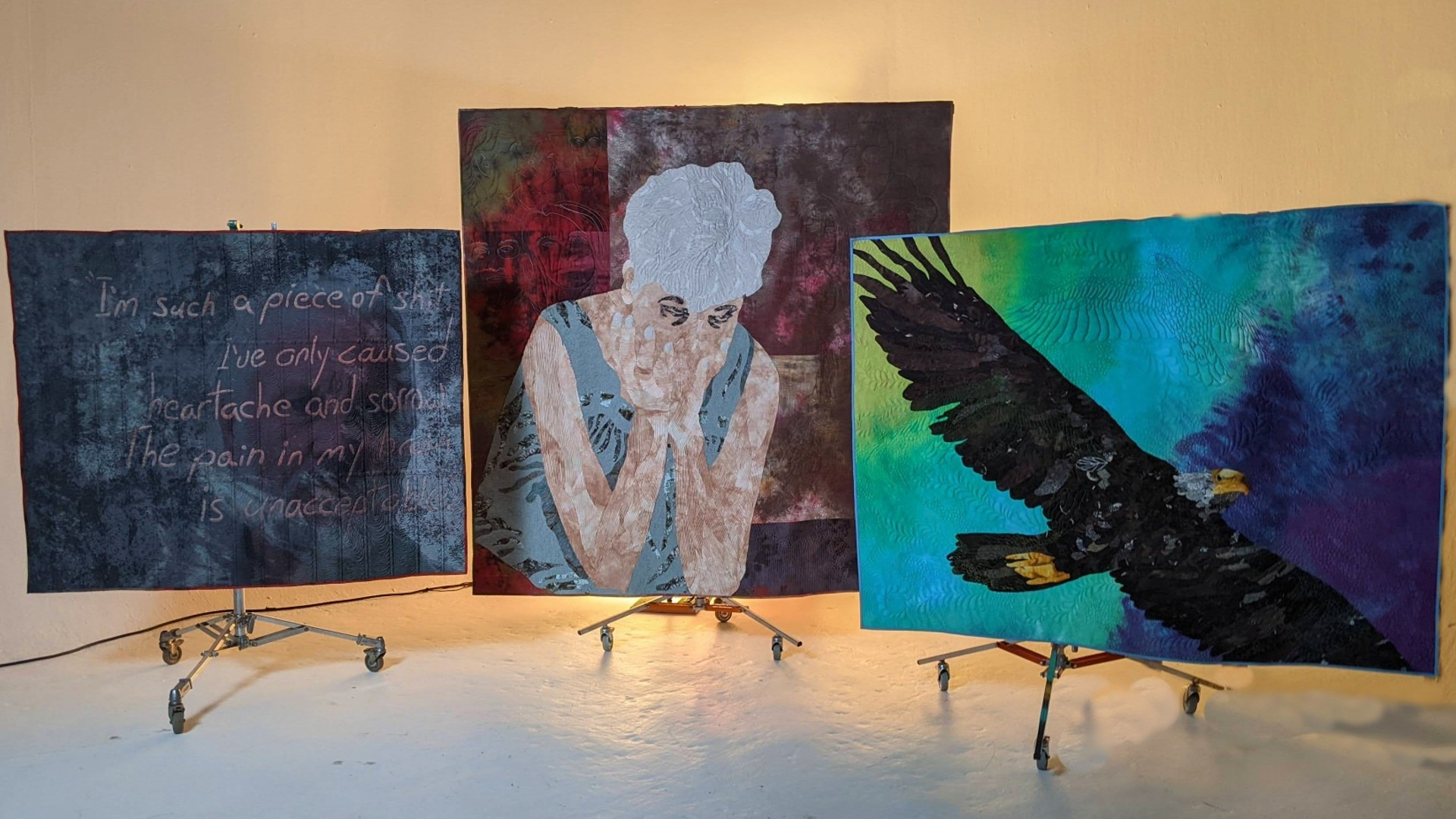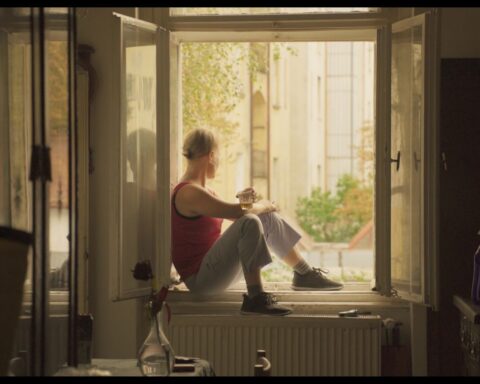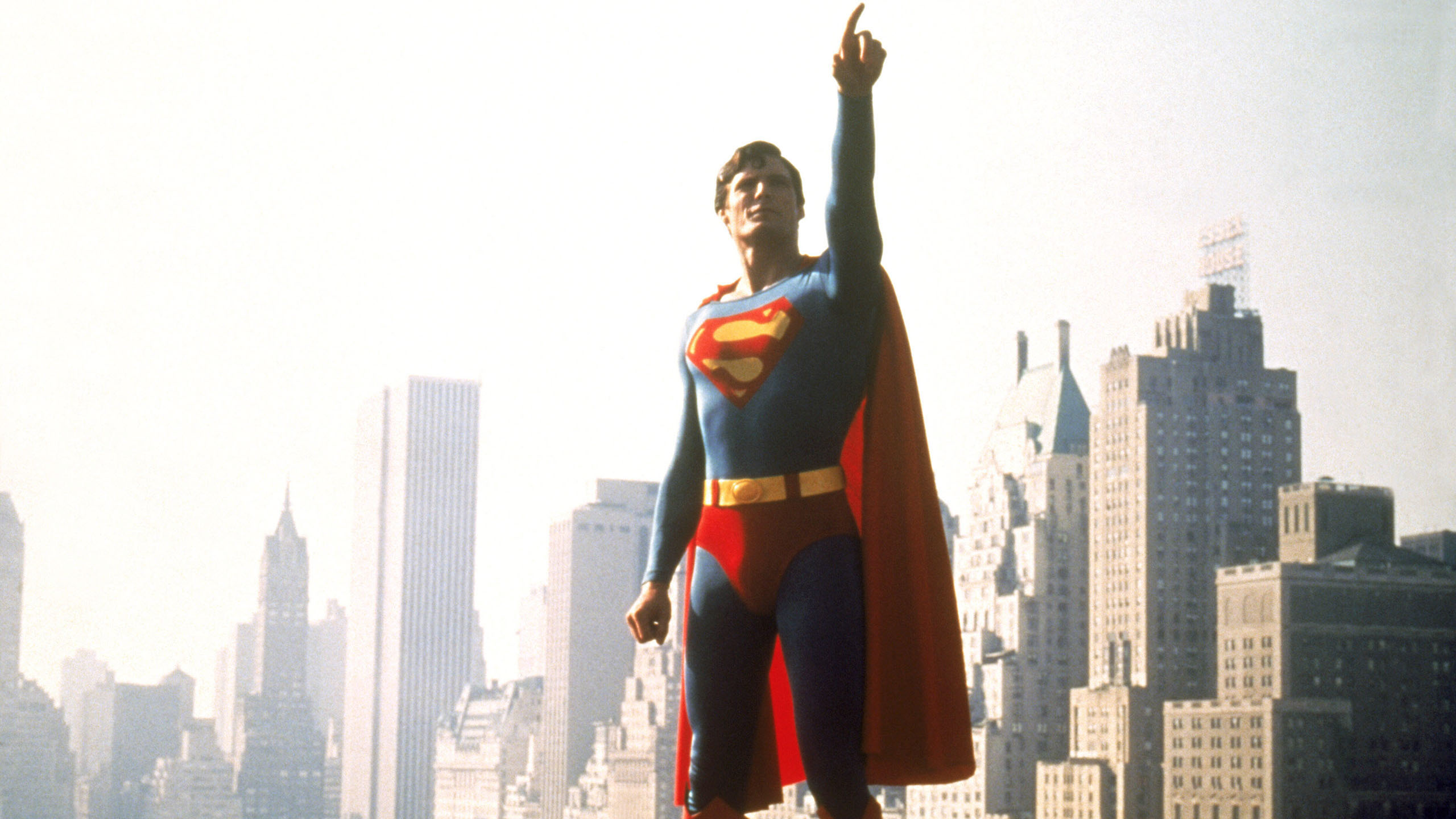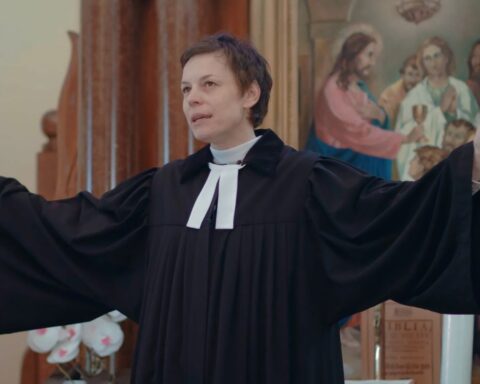A Bullet Pulling Thread
(Canada, 73 min.)
Dir. Ian Daffern
Marilyn Farquhar aims to repair Canada’s social fabric one stitch at a time. She hopes to make a difference through quilting. Farquhar, however, isn’t creating quilts to warm Canadians from coast to coast. Rather, she hopes to use provocative and deeply moving designs to open Canadians’ eyes to urgent concerns. For others, though, the quilts might literally and figuratively offer a much-needed warm hug.
A Bullet Pulling Thread, directed by Ian Daffern, observes Farquhar’s unique mission to raise awareness for the problematic relationship between mental health and policing. The inspiration for her project, a series of quilts called Kairos or “an opportune time for action” in Greek, comes from the heartache she experienced when an RCMP officer fatally shot her brother Barry Shantz outside his home in Lytton, British Columbia. For Farquhar, the loss was triply tragic since she had lost both her husband and her father to cancer within the last four months. Barry’s death was perfectly preventable, though, as Farquhar shares with Daffern how the RCMP responded to a call because her brother threatened suicide amid a mental health episode. Instead of having a counsellor speak empathetically with Barry, the police called in a crisis negotiator. His well-being, was an afterthought, if it was considered at all.
The Quilts of Kairos
Daffern shows how Farquhar channelled her grief into radical art. The quilter shares her process, which includes sketching outlines on an iPad and then crafting her blanket with meticulous needlework. Kairos offers a quilted triptych of sorts as Farquhar sews three quilts. One is a vibrant, yet subtly devastating self-portrait called “One Bullet.” Her face is in her hands and her grief is palpable. It’s a striking work that conveys her loss, but also the many lives affected by that single shot. The background of the quilt features sketches of different people impacted by the bullet that killed Barry, like the officer who can’t return to work or the unhoused people who lost their advocate in his death.
Farquhar’s quilt “His Call for Help” features a haunting pallet with the words Barry shared in distress: “I’m such a piece of shit. I’ve only caused heartache and sorrow. The pain in my brain is unacceptable.” Finally, “May Your Spirit Soar” depicts an eagle in flight and symbolizes Barry’s newfound freedom.
A Bullet Pulling Thread accompanies Farquhar on the road as she becomes determined to display these quilts from coast to coast. She drives from her home in Toronto to begin the exhibition in B.C. Along the way, Dafferen contextualizes Farquhar’s narrative with Barry’s story. The backstory portrays Barry as a passionate but complicated individual, but the nuance the film affords him ensures that he’s neither martyr nor symbol. Instead, he’s an imperfect person who fought hard and had his own struggles. Marilyn and other interviewees recall Barry’s days as a drug runner. They tell how he could outfit a big rig full of dope and/or money, but his trade eventually caught up with him when he was busted and landed in prison in the States.
Confronting Indifference
Marilyn recalls how Barry used his time behind bars to help fellow inmates transfer to be closer to their families. Even before release, she tells how he had a job lined up to facilitate his return to society. Daffern offers fiery footage of Barry returning with a vengeance as he becomes an advocate for housing rights. In clip after clip, he rallies to draw attention to the situation in Abbotsford, B.C., which has a sizable number of religious institutions, but a disproportionate number of unhoused people surviving in encampments. The bureaucratic hurdles and general indifference that Barry encounters in the archival clips echo the institutional apathy that his sister encounters from institutions.
Galleries and community centres simply won’t show her work. The RCMP even argues that it could be damaging to the mental health of officers to display the quilts. It’s an ironic slap in the face for Farquhar when she’s challenging the public inquest into Barry’s death that showed no concern for his own mental health. (A thread that explores the public inquiry highlights another bureaucratic nightmare that’s designed to clean up systemic messes, but do little to correct them.) Instead, she sets up exhibitions in parks and craft fairs. Her stories and her quilts move passersby to tears. Unsurprisingly, people have stories of loss that echo Barry’s tragedy all too well.
Furthering the Conversation
By combining the stories of these two siblings and the many lives that Marilyn touches along the way, A Bullet Pulling Thread captures the need to correct the ways in which public bodies, namely law enforcement, deal with issues related to mental health. The film adds to the conversation that docs like No Visible Trauma, Insanity, Attila, and Someone Lives Here further to challenge Canada’s institutional malaise. Moreover, the palpable portrait of grief and loss, conveyed so sincerely and intimately through Marilyn’s quilts and people’s responses to them, puts a deeply moving emphasis on the injustice created by outdated approaches to mental health.
In turn, the thoughtful approach extends both Marilyn and Barry’s stories beyond the quilting mission. Daffern addresses related social causes like housing, addiction, and the rights of incarcerated people that need to be considered in a wider conversation about leading with care in conversations about mental health. A Bullet Pulling Thread might not be the exhibition that Marilyn expected, but it’s the one she deserves.












